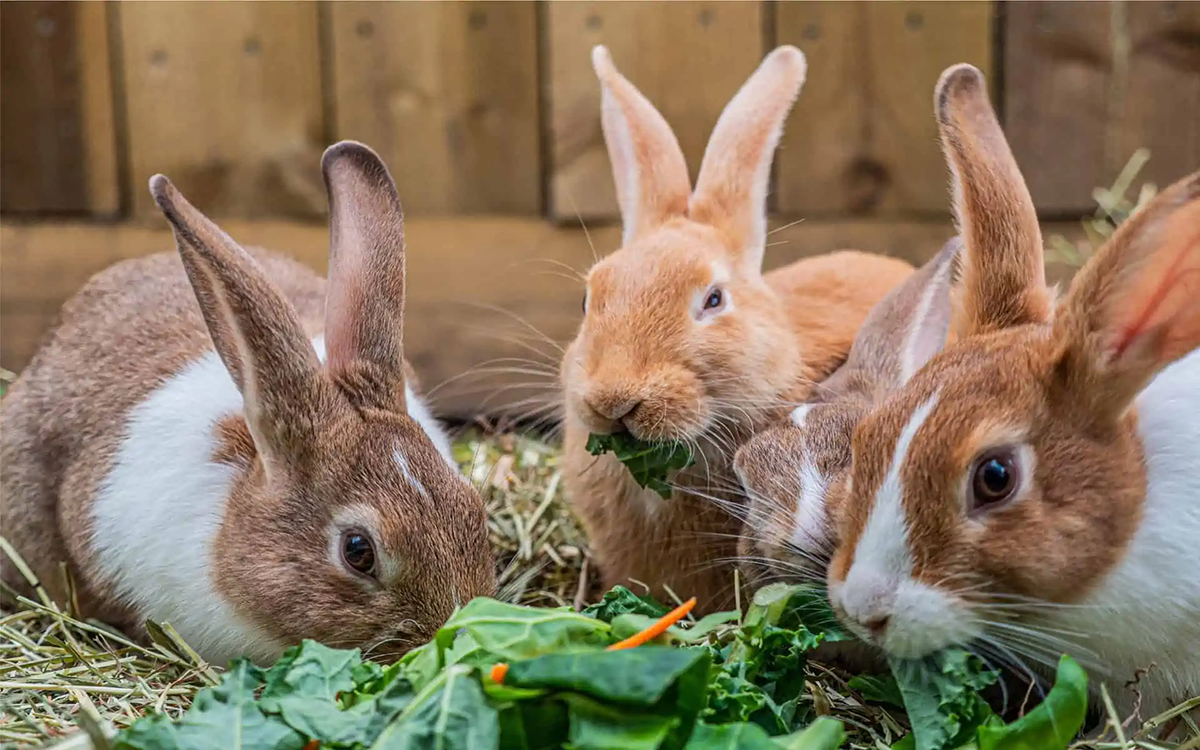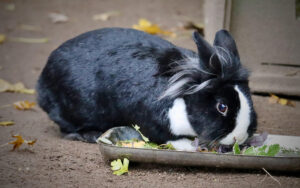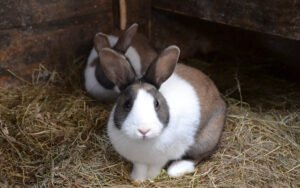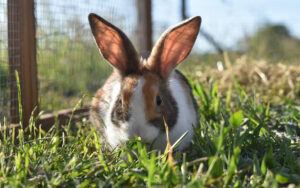Rabbits are curious, intelligent, active, and playful, and make wonderful pets. Like guinea pigs, they are also social animals and will form close bonds with other rabbits, as well as their owners. The average lifespan of a domestic rabbit is between 8 to 12 years and with the proper rabbit diet, you can help ensure your bunny lives a long and happy life. This article provides information about what to feed your pet rabbit.

What do rabbits eat and drink?
The wild rabbit’s diet differs from the domestic rabbit diet. Wild rabbits can find what they need in their natural habitat, however, when it comes to domesticated bunnies, they depend on their owners to provide them with a proper diet. While you may find that your rabbit really likes a particular type of food, especially one not available in the wild, what they like and what they should eat are often two different things. Bunnies have sensitive digestive systems and it’s important to know the difference between what foods to give rabbits, and what not to give them.
Rabbits are herbivores, which means they are only able to eat plant material. Their digestive systems are unable to handle meat, and it should never be offered to them. Rabbits also require and unlimited supply of fresh water daily to stay hydrated.
What to Feed Rabbits
Hay
Fresh grass hay is at the top of the list of rabbit food for your pet bunny and they should always have an unlimited supply available. Hay contains fiber that is vital to keep a rabbit’s digestive system functioning properly and makes up at least 80 to 90 percent of the diet for pet rabbits.
Adult rabbits should be fed fresh grass hay – such as Timothy hay, oat hay, and orchard grass. You can mix the different types together, however, it’s important to make sure the hay you feed your rabbit is as fresh as possible. Older hay that contains dust or mold can make your bunny sick.
Alfalfa should be fed to young rabbits under a year old, but because it’s actually a legume and not a grass, it has a higher sugar and protein content and should not be part of an adult rabbit’s daily diet. Adult rabbits can have alfalfa, but only as an occasional special treat. Once your bunny reaches a year old, switch them completely to grass hay.
Aside from providing the fiber that is essential for your bunny’s digestive health, chewing hay also helps to keep their teeth from becoming overgrown. A rabbit’s teeth constantly grow, which is why you will see them almost constantly gnawing on food, or chew toys made specifically for rabbits.

Vegetables
Along with hay, vegetables are also on the list of rabbit food for domestic bunnies and should make up a good portion of their diet. Adult rabbits over five pounds should be fed two cups of fresh vegetables daily, while smaller breeds under five pounds should be fed one cup.
Always introduce new vegetables one at a time in small quantities and keep a close eye on your bunny for loose stools or diarrhea. If a certain vegetable causes issues with your rabbit’s delicate digestive system, it’s best to cut it out completely from their diet. There are plenty of fresh vegetables for rabbits on the list, so if one or two do not agree with them, there are still plenty more to choose from.
Not all vegetables are created equal. Some are safe to give every day, some only once or twice a week, and some not at all. Foods such as corn, nuts, seeds, or beans should never be included in your rabbit’s diet. They are difficult for a rabbit to digest and can cause serious digestive issues.
The following is a list of vegetables that can be fed to rabbits daily. It’s best to rotate them and feed a variety to ensure you’re feed your bunny a healthy diet.
Fresh vegetables, fresh lettuce, and fresh herbs you can feed your rabbit daily:
- Arugula
- Basil
- Bell peppers
- Bok choy
- Brussels sprouts
- Butter lettuce
- Carrot tops
- Cilantro
- Cucumber
- Dill
- Endive
- Escarole
- Fennel
- Green leaf lettuce
- Mint
- Okra leaves
- Oregano
- Parsley
- Radicchio
- Radish tops
- Red leaf lettuce
- Romaine lettuce
- Rosemary
- Sage
- Thyme
- Watercress
- Wheatgrass
- Zucchini
Vegetables limited to once or twice a week:
- Broccoli – feed only the leaves and stems
- Carrots
- Chard
- Clover
- Collard greens
- Dandelion greens
- Kale
- Spinach
Flowers limited to once or twice a week:
- Calendula
- Chamomile
- Daylily
- Dianthus
- English daisy
- Hibiscus
- Honeysuckle
- Marigold
- Nasturtium
- Pansy
- Rose
Fruit
Your bunny can have fruit once or twice a week and it should be limited to 1 – 2 tablespoons per five pounds of body weight. Fruits, like other food, should be introduced one type at a time and in small quantities. Once you know your bunny can eat each fruit on the list without any digestive issues, you can serve the fruit individually or as a small mixture.
Fruit you can feed your rabbit (one or two times a week):
- Apples – any variety – no stems and no seeds
- Banana – remove the peel and limit to small slices
- Blueberries
- Blackberries
- Cherries – any variety – no seeds
- Cranberries
- Currants
- Grapes
- Melon – any type – peel and seeds are okay
- Nectarine
- Orange
- Papaya
- Peach
- Pear
- Pineapple – remove the skin
- Plums – without the pit
- Raspberries
- Star Fruit
- Strawberries
Pellets
Pellets are not an integral part of a rabbit’s diet and should only be fed in small quantities. An adult rabbit, which typically averages between 6 to 10 pounds, only needs one-quarter cup of Timothy hay pellets daily. Rabbits weighing under 5 pounds should only be fed one-eighth cup per day. Since adult rabbits cannot have alfalfa on regular basis, they should not be fed alfalfa pellets.
Baby rabbits under a year old can be fed alfalfa pellets, however, they should not be fed alfalfa and alfalfa pellets together. If you’re feeding your baby bunny alfalfa pellets, make sure to feed them grass hay rather than alfalfa.
Always make sure the pellets you feed your rabbit are fresh and are high in fiber. The higher the fiber content, the better the pellets are for your bunny. It’s important to avoid any pellets that contain fillers and harmful ingredients, such as nuts, seeds, and corn.

Treats
Like many humans, rabbits have a sweet tooth. You may be tempted to grab a bag of rabbit treats for them in the pet store, thinking it would be something they would love. Chances are they would love it, and chances are even better it’s something that’s not all that healthy for them. Many processed pet treats are made with fillers and preservatives and while convenient, they are not always the best choice.
Any of the fresh fruit listed above would make the perfect treat for your bunny. You could also try freeze-dried versions of fruit from the list above, or the Oxbow brand rabbit treats. Your best bet, though, is to simply give your bunny one of the approved fresh fruits as a treat; especially if it’s one they really love.
Water
As with all animals, water is an essential part of a rabbit’s diet. How much they drink each day depends on their age, size, and activity level. Always keep a plentiful supply of water available, and be sure to change it daily to avoid contamination.
Toys
Do bunnies need toys? The answer is: absolutely. A variety of toys play an important role in keeping your pet rabbit healthy and happy. While they’re not necessarily a part of their diet, chew toys in particular help bunnies keep their teeth from becoming overgrown.
For more information about toys that are safe and appropriate for rabbits, check out the list provided by the House Rabbit society. https://rabbit.org/faq-toys/

